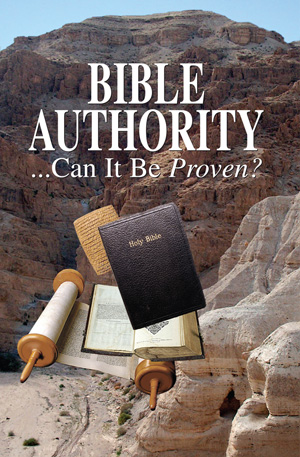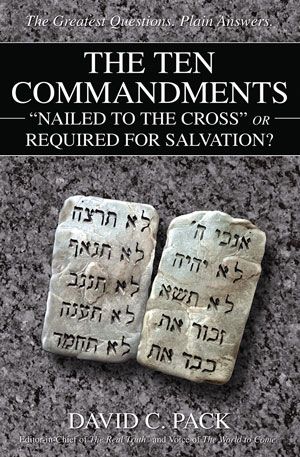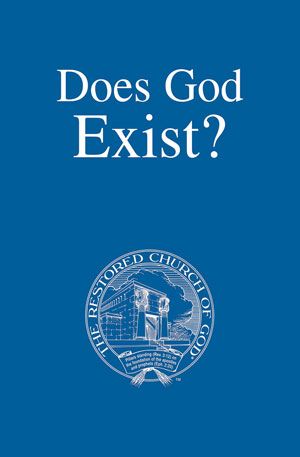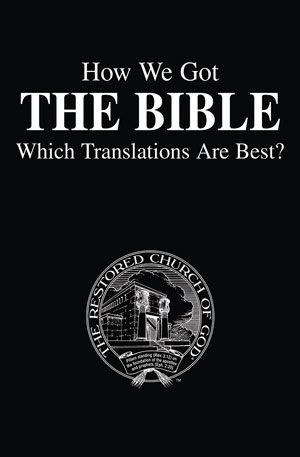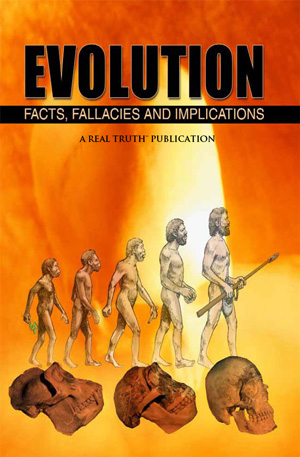The Bible has been called the Book of books and has long been the world’s best seller. Most people have one—and the “family Bible” is a cherished possession in many households. Our family Bible dates to the mid-to-late 1700s.
Then why does this best-selling book remain a mystery to so many—with few even professing to understand it? And why is it that most Bibles are used as a showpiece, lying unopened, gathering dust? Many actively try to discredit the Bible, while others treat it with passive indifference. Still others hold it in awe—believing “on faith” that it is divinely inspired. They seem to require no proof of this, yet lack the necessary conviction to truly believe and practice its words in times of great stress and personal trial.
But can one actually prove the Bible? This is a huge question! Just as most never seek to prove the existence of God, most never concern themselves with proving the authority of the Bible. They either have no interest in such proof or they assume there is none—that it cannot be done!
What about you? Have you taken the time to seek actual, tangible proof of the Bible’s authority? As with the existence of God, have you been taught that you must accept it “on faith”? Most people are never challenged to find real proof that the Bible is the inspired record of a Supreme Being. Circumstances rarely force people to undertake such a task. This is probably the single biggest reason that most never do. While I regularly “went to church” when growing up, I was never required, nor felt compelled, to prove either that God exists or that He authored the Bible. Nor was any proof of these ever given or offered to me! And not one person ever suggested to me that I should even be concerned with proving the answers to these two looming questions.
Stop and think for a moment! Let’s apply basic logic.
What kind of God would write an Instruction Book about how to live, command that it be followed as His Word and then offer no proof that it is? It insults whoever is God to even believe Him capable of such inconsistency—and unfairness! On what basis would He—or even could He—require obedience to such an Instruction Book, if He left no proof that it was authentic?
The apostle Paul wrote in the Bible, speaking on behalf of the One who claims to have authored it, “Prove all things; hold fast that which is good” (I Thes. 5:21). If God wrote the Bible, and He tells you to “Prove all things,” then surely He would not make proof of His authorship of the Bible an exception. It states, “ALL things.” In other words, would God require you to prove what the Bible teaches about all other points of doctrine or practice, but not expect you to prove whether an all-powerful God stands behind its authorship, requiring you to then obey it—adhere to its teachings? What sense would that make? God would never exempt from the need for proof (thus making them towering exceptions to this command) the questions of His own existence and His authorship of the Bible!
We must take this instruction at face value. If God says to “Prove all things,” and also, “Prove Me now herewith…” (Mal. 3:10), then He means it. And if God did not make the answers to these questions provable, He is setting Himself up to be discredited. On the other hand, if the Bible is the inspired Word of a great living God, then it is the standard by which you will be judged. Then dare you delay any longer the process of proving its all-important authority in your life?
Most spend their entire lives worried about what people think and say. Few concern themselves with what God thinks or says. Be honest and consider yourself. How much time have you spent trying to prove either the existence of God or that the Bible is His Word?
So then, the answer to both of these questions is that they can be proven. And you will notice, as we summarize the first great proof of the Bible, that it is also inseparable from proof that God exists. In fact, each different proof that the Bible is the Word of God is also its own proof that there IS a God!
The First Proof—Evolution Disproved?
No discussion about the Bible’s authorship would be complete without addressing the subject of evolution. It represents, perhaps, the first proof, in overall priority, that should be examined.
Most people have been taught from childhood that mankind evolved through a long process. While the theory of evolution is commonly accepted throughout the Western World, it has never been more than an unproven theory. Yet, to believe in the biblical Creation account is considered unfashionable, un“chic” and even unintelligent. And, of course, if the theory of evolution is true, then the Bible is a flawed book. Think. If the Bible can be so wrong, on a matter as important as the beginning of all life on Earth (“Genesis” means beginning), then it cannot be trusted on any other point. If evolution occurred, the entire Bible collapses like a house of cards.
If evolution can be disproven, and the Creation account firmly established, then a great proof of the Bible’s authority has also been established.
Make no mistake! all of the Bible purports to be the Word of God. It all stands or it all falls together. Either the Bible is a book of truth from start to finish—and mankind should tremble before it—or, if evolution is true, the Bible must be judged false. It would thus stand as the greatest fraud ever perpetrated on an unsuspecting mankind!
We have carefully prepared a booklet, Does God Exist? It is a companion to this booklet and establishes, irrefutably, through many proofs, the absolute existence of God. Again, this question is inseparable from that of whether evolution occurred. It also firmly establishes the utter impossibility of evolution, leaving no doubt why the God of the Bible states, “The fool has said in his heart, There is no God” (Psa. 14:1; 53:1).
Space does not permit repeating that entire booklet here. However, it covers proofs from astronomy, the laws of thermodynamics, the fossil record gap, the concept of “irreducible complexity” as per DNA and cells, the presence of “tiny engines” inside cells, the law of biogenesis, the extraordinary complexity of the human mind, the amazing human eye, the nature of Australian termites, the impossibility of certain kinds of fish and birds having evolved—and the staggering mathematical improbability that even one planet like Earth could have appeared anywhere in the universe by chance. These proofs establish not only that God does exist, but also that the Genesis Creation account is the only plausible explanation for the origin of life.
The evidence is plain, emphatic and irrefutable—and establishes the biblical account beyond question! The fact that certain “fools” (God’s choice of terms, not mine) might ignore, reject or seek to discredit them is irrelevant to their validity. I ignore such people because I am instructed in Proverbs to “Answer not a fool according to his folly, lest you also be like unto him” (26:4). People who reject absolute proof are foolish and ought not to be dignified with an answer to their foolishness. This booklet has been written for those who seek—who want—the truth!
Evolutionists invariably use terms like “We suspect…We are coming to believe…What may have happened…We may theorize that…It is our opinion…What probably occurred…We do not know…,” etc. These terms do not inspire much confidence. The dogmatic statements of the Bible do! The God of the Bible never speaks in such uncertain terms. He does not have to. He not only knows He created mankind, but that it also can be proven. Thus, He speaks boldly—with authority—about what He has done!
Consider further. Evolutionists do not know the purpose of life. They do not know why they were born. And they reject the authority of God’s Word because they do not want Him “sticking His nose” into their lives. If they can discredit the authenticity of His Word, then they need not obey Him.
I cannot make you accept the proofs of God’s existence. These are decisions you must make. I cannot force you to act upon proofs of the authority of His Word. I disproved evolution over 45 years ago and had no choice but to act on this knowledge, if I were to remain an honest seeker of truth.
Remember, it is in the Bible that the six-day Creation account of God creating all plants, animals and man himself is found. If evolution is disproven, it is the very Bible account that is verified—validated—established—as the true record of how all life on Earth came into being. We have now established the first great proof of the Bible. However, until you have read Does God Exist?, this proof is not complete. Take time to read it. (And also read our brochure Evolution – Facts, Fallacies and Implications, which thoroughly disproves evolution.)
The Cause and Effect Principle
We are now ready to examine the important proof of the principle of cause and effect.
Most people live their lives completely unaware of why things either “go right” or “go wrong.” They seem unable to comprehend that what they do, or do not do, has a direct effect on their lives. Most do not recognize that for every cause there is an effect, or conversely, for every effect, there is a cause. Scientists understand this principle in physics, but mankind is unaware that the same is true spiritually.
Consider a few basic points. Let’s reason together. Exactly how does cause and effect work in one’s life? Some simple examples bear examination.
If you routinely eat too much, what happens? You will get sick, or fat—or both! There is no mystery to this.
If you drink too much alcohol, you will become intoxicated. This could lead to a next-day headache, being arrested, or even an auto accident that could result in injury or death to yourself or others. Again, there is no mystery to this.
If you break laws, you could go to jail or prison. This will affect your family, employment opportunities and your entire future. Once again, no mystery.
In this way, the law of cause and effect impacts your life—and the life of everyone on Earth—in endless ways.
If industry pollutes the environment, the result is polluted air or water, or even the much-debated problem of global warming. If countries go to war, the result is economic upheaval, disease, famine and general misery for all involved. If parents neglect the proper rearing of their children, or children do not obey their parents, the result could be poor performance in school, drug addiction, criminal conduct or worse. None of this is hard to understand.
But the Bible is also a book about cause and effect! It contains literally hundreds of different laws, each carrying the power of cause and effect for those who keep or break them.
Whether one identifies and knows all the laws of the Bible is not relevant to whether breaking them will bring punishment. Just as speeding can result in a ticket, whether the driver knew the speed limit or not, so those who break the laws of God reap penalties—whether they know they are violating specific laws or not!
Look at the world around you. It is filled with confusion, poverty, disease, ignorance, war, chaos and misery. Have you ever asked yourself why ? What is the reason mankind has never been able to solve these problems? Why do they only grow worse with the passing of time? Because the laws of God are being routinely broken by Earth’s billions of human inhabitants.
The One who claims to have written the Bible states that His great law, the Ten Commandments, is “holy, just, good and spiritual” (Rom. 7:12, 14). Again, consider your basic understanding of cause and effect. When those laws are obeyed, it can be proven that they bring blessings, benefits and good things into the lives of those who obey them. Mankind has rejected the Instruction Book that would reveal to him the cause of all his problems and misery.
Space does not permit that this booklet cover, in precise detail, the many laws of God, and how they are related to cause and effect. However, throughout the Bible, its Author promises blessings, benefits and good results to those who take each particular promise at its word. (Read our book The Ten Commandments – “Nailed to the Cross” or Required for Salvation?)
God promises to heal all those who keep His laws and exercise faith in His power to perform the healing (Ex. 15:26; Jms. 5:14-15). He promises to greatly bless all those who obey His Sabbath (Isa. 58:13-14; Mark 2:27-28). He promises good health to all those who obey His many health laws. Each promise involves employing a right cause (obedience) to achieve a right effect (blessing or benefit).
In each of these cases, and in many others, God describes a cause and effect relationship that proves the inspiration behind His instructions. But it will only work for those who are willing to take Him at His Word!
While the determined skeptic will reject the reasoning described here—and do it to his own great hurt, because he thinks he can defy the law of cause and effect—the one who is willing to take the Author of the Bible at face value will find an almost endless series of proofs that the Bible is not a book of men. However, this booklet is not written to, and cannot help, the closed-minded skeptic. But it certainly can help you, if you remain open to the powerful proofs that await examination.
The Proof of Prophecy
The most powerful—and perhaps the single most convincing—proof of the authority of the Bible is the proof of fulfilled prophecy. It stands undeniable.
Everyone wants to know what the future holds. In ever-increasing numbers, people are seeking psychics, “channelers,” tarot card and palm readers, fortunetellers, crystal ball gazers and every other medium to tell them what is going to happen. And they pay for this “service.” Yet, few go to the one infallible source, which foretells all the important events that will soon come upon the entire world.
Few understand that nearly one-third of the Bible is prophecy—that it is a history book written in advance of the history that it records.
If I offered to tell you of major, soon-coming events, and could offer proof to you that they were absolutely certain to happen, what would you do? What would you say if I could cite specific, detailed trends and events that would affect every country upon Earth? Then what if I told you that I would not bill you for it—that I would offer it to you free of charge? Would you be interested?
Well, let me tell you that is exactly what I can do! I can even show you where and how you can learn it for yourself! And afterwards, I tell you that you can rest assured that what you have learned will occur—and is no less certain than tomorrow’s sunrise. And when you have completed reading the balance of this booklet, it will be clear that you need never again doubt the authority of anything found in the Bible—including all matters discussed in its remaining two-thirds!
God’s Own Challenge to Disbelievers
Consider the following great challenge—or dare—from the One purporting to be the God of the Bible. It is quoted from the Moffatt translation of the Bible: “Now, the Eternal cries, bring your case forward, now, Jacob’s King (God) cries, state your proofs. Let us hear what happened in the past, that we may ponder it, or show Me what is yet to be, that we may watch how it turns out; yes, let us hear what is coming, that we may be sure you are gods; come, do something or other that we may marvel at the sight!—why, you are things of naught, you can do nothing at all!” (Isa. 41:21-24).
Who dares to take God’s challenge?
Fulfilled prophecy proves the divine authority of the Bible. No human can foretell events, let alone in great detail, to occur hundreds or thousands of years beyond his own lifetime. No person can affect the course of cities, states or kingdoms for centuries to come. For this reason, it has been said that prophecy is the challenge that the skeptics dare not accept! How true!
God taunts all such skeptics in the above verses.
The One who authored the Bible states in Isaiah 46:9-10: “I am God, and there is none else; I am God, and there is none like Me, Declaring the end from the beginning, and from ancient times the things that are not yet done, saying, My counsel shall stand…” Only an Omnipotent Being has the power to actually carry out events that span centuries or millennia of time. Only God can create or destroy nations or pronounce sentence on an entire civilization and bring it to pass!
Yes, prophecy is a great proof of God. We will now examine the longest single prophecy in the Bible.
Prophetic Role of the Middle East
Events in the Middle East carry far greater significance than most even begin to understand! It has been said that every eight years the Middle East suffers another war. Recent history bears the truth of this statement. This geographical area has been a bubbling caldron of unrest, contention, terrorism and failed attempts at peace for ages. Its problems defy a simple solution—and this booklet will prove that only God can bring the peace that all there long for.
The whole world is tied to the Middle East in a remarkable way. The problems there will not go away, nor can the world pretend they will by simply looking the other way!
The Middle East is at the center of a great prophecy of which the world is ignorant. But for individuals who want to know God’s Plan, this need not be. The facts of this wonderful plan can be known. The great God, who made the heavens, the Earth—and you—holds the key to both knowing and solving the “Middle East problem.” You need not be ignorant—you can know His solution.
Daniel’s Amazing Prophecy
God is working out a great Plan on Earth. Most people are completely unaware that there is a purpose for mankind—let alone what it is! The present and future of the Middle East play a large role in God’s Master Plan for humanity, and this region is at the center of an astounding prophecy that will affect the lives of all people on Earth before this age is finished.
Over 2,500 years ago, God inspired Daniel to record a great prophecy involving many fascinating twists and turns throughout history. This prophecy will culminate with tremendous events that will occur in our time! These amazing events will stun and impact all nations—and yet they have been sealed, closed until this age!
Some Bible prophecies are general. Others are highly specific. Some involve single events that occur at specific moments in time. Others are fulfilled slowly over many years—or even over many centuries or millennia. Daniel’s prophecy involves many smaller prophecies that we shall examine one by one, until we arrive at the modern age.
Nearly all theologians almost eagerly offer their opinions about the Bible’s many prophecies—and they “interpret” them as they see fit. The true Bible student must always let the Bible interpret the Bible! We are about to examine one long chapter in the Bible. It will become clear that there is only one way to explain each of the forty-five separate verses in this chapter. The fulfillment of each verse is not subject to human reasoning, opinion or interpretation!
Many of these prophecies have been fulfilled exactly as God foretold, and have taken their place in history. They are now facts that can be examined—and are powerful proofs that a Supreme Being foretold them and then brought them to pass!
This long prophecy is found in Daniel 11. In chapter 10, Daniel is left astonished—completely shocked and overwhelmed by what God revealed would happen “at the end,” or in the last days. Chapter 12 concludes the lengthy prophecy of chapter 11.
Open your Bible and read each verse beside the text of this booklet. No other approach will have the same impact. Also, bear in mind that men inserted all chapter and verse divisions of the Bible. While these are often helpful to Bible students, they can also inadvertently break up long stories, thoughts or, as in this case, prophecies. The true meaning and scope of the subject matter are often obscured or lost from view.
Two Prophesied Great Kings
God gave Daniel this prophecy during the third year of the reign of Cyrus, the king of the Persian Empire (10:1). Daniel recorded that two powerful kings (actually competing kingdoms) would play a large role in Middle Eastern events, until the time of the end. These kings set the stage for the unfolding of vitally important future events, which culminate before Christ returns!
Two key verses set the stage. In Daniel 10:21, the archangel Gabriel speaks to Daniel: “But I will show you that which is noted in the scripture of truth.” Chapter 11 introduces the time setting. Verse 2 continues, “And now will I show you the truth.” When God foretells events, He speaks the truth! They are certain! They will happen! Since no scripture can be broken (John 10:35), neither can any verse of this prophecy!
Consider the following verses: “Behold, there shall stand up yet three kings in Persia; and the fourth shall be far richer than they all: and by his strength through his riches he shall stir up all against the realm of Grecia. And a mighty king shall stand up, that shall rule with great dominion, and do according to his will” (Dan. 11:2-3).
Who are these four kings—where the last is greater than the first three? And who is the “mighty king”? Daniel was speaking of kings Cambyses, Smerdis and Darius of Persia as the first three, with Xerxes being the greatest and richest of the four. It was Xerxes who “stirred up” war with Greece.
We must now study several verses in Daniel 8. Alexander the Great’s father, King Philip of Macedonia, created a master plan to conquer and defeat the Persian Empire with a Greek army. But Philip died before he could execute his plan. His son invaded Persia in his stead, and Alexander the Great’s army fought the Persian army at the famous Battle of Issus in 333 BC (Daniel 8:2, 5-6).
Two years later, in 331 BC, in a second battle at Arbella, Alexander completely defeated the Persian Empire. Having already conquered Egypt shortly before this, he followed this battle with the destruction of everything from the Middle East to India. This happened precisely as prophesied!
Daniel 11:4 says this of Alexander: “And when he shall stand up, his kingdom shall be broken, and shall be divided toward the four winds of heaven; and not to his posterity, nor according to his dominion which he ruled: for his kingdom shall be plucked up, even for others beside those.”
Numerous historical authorities acknowledge that Alexander died suddenly, at age thirty-two, when he was “Cut off unexpectedly in the vigour of early manhood, he left no inheritor, either of his power or of his projects” (Rawlinson’s A Manual of Ancient History, p. 208). Alexander’s kingdom did break into four separate kingdoms, because he had no son to take his place. Prophecy was fulfilled just as God foretold.
The following four of Alexander’s generals represent the “four winds of heaven”—or directions to which his kingdom was divided: (1) Lysimachus ruled Asia Minor, (2) Cassander ruled Greece and Macedonia, (3) Seleucus ruled Syria, Babylonia and all regions east to India and (4) Ptolemy ruled Egypt, Judea and part of Syria.
From this point, the prophecy tracks two of these four kings or divisions of territory. The Syrian kingdom represents the “king of the north.” The Egyptian kingdom represents (vs. 5) the “king of the south,” because Egypt is generally south of Jerusalem. (Jerusalem is the central focus of all prophecy and, therefore, directions are always established by identifying locations in relation to this city.) These two kingdoms often fought back and forth across Palestine—the Holy Land and Jerusalem—with possession of this area constantly shifting, depending on the outcome of the last battle.
Ptolemy I, named Soter, established Egypt as a far greater, more dominant power than when Alexander was alive. Seleucus also became very strong. By 312 BC, he had established an equally powerful kingdom in Syria. These two kingdoms became and represent, respectively, the “king of the south” and the “king of the north,” mentioned throughout this prophecy. Daniel 11:5 states, “And the king of the south shall be strong, and one of his princes; and he shall be strong above him, and have dominion; his dominion shall be a great dominion.”
Amazing Fulfillment of Verse Six
Verse 6 is a specific and truly remarkable prophecy. Notice: “And in the end of years they shall join themselves together; for the king’s daughter of the south shall come to the king of the north to make an agreement [notice the term used in the margin, “rights,” meaning marriage union or rights, in this case]: but she shall not retain the power of the arm; neither shall he stand, nor his arm: but she shall be given up, and they that brought her, and he that begat her, and he that strengthened her in these times.”
Fifty years later, Antiochus II (called Theos) was the king of the north, ruling at Syria. His wife, Laodice, carried great influence in the kingdom. But Theos divorced her and married Bernice, the daughter of the king of the south. Bernice was to lose the “power of her arm.” Her husband, the king of the north, was prophesied to not “stand,” and she and her father (“he that begat her”) were both prophesied to be “given up.” These three did come to a bad end.
An amazingly detailed, precisely fulfilled prophecy ensues from verse 6. Rawlinson states that “Her [Laodice’s] influence…engage[d] him in a war with Ptolemy Philadelphus [king of the south], BC 260, which is terminated, BC 249, by a marriage between Antiochus and Bernice, Ptolemy’s daughter…On the death of Philadelphus [“he that begat her”], BC 247, Antiochus repudiate[d] Bernice and [took] back his former wife, Laodice, who…doubtful of his constancy, murder[ed] him to secure the throne for her son Seleucus [II] BC 246…Bernice…had been put to death by Laodice” (p. 222).
We now examine the longest prophecy in the Bible, verse by verse.
Control of the Holy Land Shifts Repeatedly
Notice verse 7: “But out of a branch of her roots [Bernice’s parents] shall one [this is her brother who would take the throne in his father’s stead as the king of the south] stand up in his estate [“in his office,” margin], which shall come with an army, and shall enter into the fortress of the king of the north, and shall deal against them, and shall prevail.”
Rawlinson states, “Ptolemy Euergetes [the III, eldest son of Philadelphus, and therefore Bernice’s brother, a branch of her roots] invade[d] Syria, BC 245, to avenge the murder of his sister Bernice…In the war which follow[ed], he [carried] everything before him” (p. 222).
Verse 8 speaks of the king of the south carrying silver and gold vessels, with captives, back to Egypt (vs. 9) after a successful invasion of the north. In fact, Ptolemy III did conquer Syria, the Port of Antioch (capital of the kingdom) and Seleucia. He took a vast amount of spoils, including the return of 2,500 idolatrous vessels and molten images that, in 526 BC, the northern king, Cambyses, had taken from Egypt.
The passage also states that King Ptolemy III would rule longer (“more years”) than the king of the north, Seleucus II. Seleucus died in 226 BC, and Ptolemy III reigned four years longer, until 222 BC.
At the death of Seleucus II, his kingdom was ruled successively by his two sons. Seleucus III reigned just three years (226-223 BC), while his brother, Antiochus III, also called “the Great,” reigned for 36 years (223-187 BC). Each established great armies to fight Egypt, recover their port city of Seleucia and avenge the defeat of their father.
It took twenty-seven years for Antiochus to recapture Seleucia and conquer Syria and the area from Judea to Gaza. Verses 10 and 11 state, “But his sons shall be stirred up, and shall assemble a multitude of great forces: and one shall certainly come, and overflow, and pass through: then shall he return and be stirred up [“be stirred up again,” margin], even to his fortress. And the king of the south shall be moved with choler, and shall come forth and fight with him, even with the king of the north: and he shall set forth a great multitude; but the multitude shall be given into his hand.”
Ptolemy IV fulfilled verse 11 exactly. After gathering an army of 20,000, he did “move with choler [anger]” against Antiochus the Great. He fulfilled verse 12 because he did “cast down [kill] many ten thousands.” However, he retreated too soon to Egypt, having made too hasty a peace with Antiochus, and wasted the substance he had gained, hence the phrase, “but he shall not be strengthened by it” (i.e., his victory over Antiochus in 217 BC).
Twelve years later (205 BC), Ptolemy Philopator, king of Egypt, died. His baby son, Ptolemy Epiphanes, was given the throne. Thus, Egypt became vulnerable to attack. Antiochus took advantage of this vulnerability “after certain years” by defeating Egypt. Verse 13 explains, “For the king of the north shall return, and shall set forth a multitude greater than the former, and shall certainly come after certain years with a great army and with much riches.”
Soon thereafter, Antiochus formed an alliance with Philip of Macedonia to attack Egypt and retrieve Phoenicia and Southern Syria from Egypt. The famous Jewish historian, Josephus, states that a large number of Jews joined Antiochus in this campaign. Verse 14 describes this. Again, you should try to carefully read each verse from your Bible as this outline of history is laid before you.
Next, Antiochus laid siege all the way from Egypt to Sidon, eventually seizing control of Judea in 198 BC, at the Battle of Mount Panium. Notice the reference to the Holy Land (Judea) as “the glorious land” (vs. 15-16).
At this time (198 BC), Antiochus arranged to have his daughter, Cleopatra, and the now little boy king, Ptolemy Epiphanes, marry. But this plan to control and possess Egypt, through deceit, failed, because Cleopatra deceived her father, Antiochus, and did not help him take control of Egypt (vs. 17). (This was not the same Cleopatra as the famous Egyptian queen of 31 BC.)
This caused Antiochus to focus on defeating and taking control of the coasts of Asia Minor, including the islands around it (197-196 BC). However, in the Battle of Magnesia (190 BC), Lucius Cornelius Scipio Asiaticus, the Roman general, defeated him and destroyed his army (vs. 18).
Daniel records, “Then he shall turn his face toward the fort [fortresses] of his own land: but he shall stumble and fall, and not be found.” Antiochus, after redirecting his concerns toward his own fortresses, was killed in 197 BC while seeking to consolidate his assets by plundering the Oriental Temple of Belus in Elymais (vs. 19).
Heliodorus, the “raiser of taxes,” was sent by Seleucus IV Philopator to raise money throughout Judea. However, Heliodorus poisoned Seleucus IV, who consequently reigned only eleven years—187-176 BC (vs. 20).
Seleucus IV had no heir, so his younger brother (Epiphanes or Antiochus IV) won control of the kingdom by flattery (“flatteries”) and deceit. As the next verse states, this man was an extremely “vile,” contemptible person and his aid, Eumenes, did come to assist him (vs. 21). Rawlinson states that “Antiochus [Epiphanes], assisted by Eumenes, drives out Heliodorus, and obtains the throne, BC 176. He astonishes his subjects by an affectation of Roman manners…[and] good-natured profuseness [flatteries]” (p. 225).
The Role of Antiochus IV (Epiphanes)
The next verse pictures an effort by Antiochus Epiphanes to remove the Jewish High Priest (“prince of the covenant”). Antiochus’ purpose was to install someone who would be loyal to him. Some misunderstand the term “prince of the covenant” to be a reference to Christ. However, it is not (vs. 22).
The next three verses are an insight into Antiochus’ character and manner. He started with a small group of supporters, yet through flattery and deceit he slipped into greater power and secured greater numbers of followers. Although his ancestors granted favor to the Jews, he swept into Lower Egypt and Galilee, thereby alienating the Jews. Rawlinson states that the Jews “were driven to desperation by the mad project of this self-willed monarch” and “Threatened with war by the ministers of Ptolemy Philometor [the then king of the south], who claim Coele-Syria and Palestine as the dowry of Cleopatra, the late queen-mother, Antiochus marches against Egypt…” (p. 225).
This occurred in 171 BC. It was then that his nephew (Ptolemy Philometor) attacked him with a “great army.” However, Ptolemy’s officers betrayed him to Antiochus and he lost the battle (vs. 23-25).
In 174 BC, Antiochus had joined his young nephew Ptolemy at a feast. Antiochus feigned support for Ptolemy against his brother, Euergetes II, in a case of mutual deceit (vs. 26-27).
The Abomination of Desolation
Next, Antiochus decided to attack and slaughter as many Jews as possible. Upon returning from Egypt in 168 BC, with “great riches,” he sacked the Temple at Jerusalem and took the golden vessels from it—all as part of his planned genocide of the Jews. He turned back toward Egypt, this time without similar success, because Ptolemy Philometor had secured assistance from Rome (vs. 28-29).
The Roman commander, Popillius, brought his fleet of ships to attack Antiochus. Popillius secured surrender on his own terms, which included leaving Egypt after returning Cyprus to Egypt. This caused Antiochus, once again, to vent his anger against Judea (the Jews) as he was returning to Antioch. This “indignation against the holy covenant” offered favor to any Jews who would renounce their beliefs and practices (vs. 30).
Antiochus dispatched troops to Palestine one year later, in 167 BC, with terrible results for all who fell in his path. He destroyed the Temple and its sanctuary—doing away with the daily sacrifice, while setting up an image, a “type” (forerunning parallel event) of the “abomination of desolation” (Dan. 11:31; Matt. 24:15; Mark 13:14), directly on the altar of the Temple—thus defiling it, or making it desolate! There are those who attempt to portray this verse as having been fulfilled at the time the Dome of the Rock was built on the Temple site, over eight centuries later, in the seventh century AD. For this to be true, all of the verses that have been explained to this point would require some other equally plausible explanation to “work” with the precision we have seen every step of the way thus far. Antiochus Epiphanes placed the “abomination that makes desolate” in the Temple in 167 BC (vs. 31).
Antiochus’ prophetic fulfillment of this verse is a great type of a latter day fulfillment to occur in our time. Luke 21:20 makes plain that Jerusalem will be left in “desolation” by “armies” that will “surround” and destroy it. It is important for the reader to recognize that God often uses duality to show the world, through prior similar events, exactly what He intends to do again—to repeat—usually in a far greater way, in the future.
This is an absolutely vital key to understanding the meaning of all Bible prophecy!
End-Time Prophecy
The first part of verse 32 describes Antiochus’ attempt to destroy the Jewish religion. He actually outlawed both the daily sacrifice and the daily ministration of the Temple through a system of flattering (with favors) any Jews who would renounce their beliefs.
It is critical to understand that, from the middle of verse thirty-two, the prophecy shifts forward to modern times—the last days. Up to this point, we have watched each step of this prophecy unfold through two centuries of time. The time setting now fast-forwards approximately 2,100 years to depict events yet to be fulfilled, “even to the time of the end: because it is yet for a time appointed” (vs. 35). Notice that verse 32 speaks of “people that do know their God shall be strong and do exploits [great works].” Verse 33 continues, “they that understand among the people shall instruct many.”
These two portions of verses picture two entirely different time settings—the first being a type of the latter.
Daniel specifically records that at the time of the end (12:10), “none of the wicked shall understand; but the wise shall understand.” The entirety of Daniel 12 is a continuation of this end-time setting—established from here forward. While these verses contain fascinating knowledge, it is not the purpose of this booklet to explain how this prophecy will play out in the very near future. (Our booklets Are These the Last Days? and How God’s Kingdom Will Come – The Untold Story! discuss this in greater detail.)
One Final, Unusual Prophecy
There is one last prophecy that needs to be examined. It is God’s personal challenge to you on a specific matter wherein He says that you can prove Him. It is the remarkable prophecy concerning the biblical principle of tithing found at the end of the Old Testament.
The prophet Malachi asks, “Will a man rob God?” (Mal. 3:8). Be careful that you do not say that this is an Old Testament scripture with no effect today.
Did you realize that the New Testament Church is built directly on top of the prophets? I never heard this in Sunday school or in the church of my youth. Ephesians 2:19-20 says God’s people are “fellowcitizens with the saints, and of the household of God; and are built upon the foundation of the apostles and prophets, Jesus Christ Himself being the chief corner stone.” There it is—the Church stands directly on a foundation that includes the prophets! What is written in the prophets is instruction to God’s New Testament Church!
We can now read a powerful series of verses. The first two set the stage for a verbal exchange between God and His people. Notice: “For I am the Lord, I change not…Even from the days of your fathers you are gone away from Mine ordinances, and have not kept them. Return unto Me, and I will return unto you, says the Lord of hosts” (Mal. 3:6-7). The exchange then shifts to a rhetorical question from the people to God: “But you said, Wherein shall we return?” Now God answers with His own question: “Will a man rob God? Yet you have robbed Me.” The context returns to another rhetorical question from the people: “But you say, Wherein have we robbed You?” God’s answer is: “in tithes and offerings” (vs. 7-8). When people do not pay God His tithes—and do not give Him His offerings—He considers them to be robbing Him. Robbing is thievery—stealing! Not only is it stealing, but it is stealing from God!
Few things could be more serious!
Stealing from God brings consequences. In the next verse, God continues, “You are cursed with a curse: for you have robbed Me, even this whole nation.” This statement has application to all the modern-day nations that descended from the twelve tribes that comprised ancient Israel. Generally, these nations are the democratic nations of Western Europe, and the primarily English-speaking nations of the world—the United States, Canada, Britain, Australia and New Zealand.
These nations are under a growing curse for their sin of stealing God’s tithes. Remember that Abraham and Isaac were not Israelites, yet were required to pay tithes. Therefore, all nations suffer from the curse of not obeying God’s financial laws.
This world is based on the “get” way rather than the “give” way, which is God’s way! People constantly strive to “get” more for themselves. This violates the Tenth Commandment, which forbids coveting. Notice what God says of His people, and of all nations, in a prophecy directed to those alive at the end of the age: “For from the least of them even unto the greatest of them every one is given to covetousness; and from the prophet even unto the priest every one deals falsely” (Jer. 6:13).
Two chapters later, there is an almost identical statement, except that God also warns of the horrific punishment He will bring because of this worldwide attitude.
The book of Malachi references God’s coming punishment on the entire world. This theme is found in nearly all of the Minor Prophets—the last twelve, short books of the Old Testament. Malachi continues and actually pictures tithing as the key to a repentant attitude.
Consider!
How could God punish nations for robbery, if the tithing law is not in effect today? This would make no sense and would make God terribly unjust if He did this.
The context of Malachi continues with an offer from God. It is directed both at the modern peoples of Israel and to any single individual who chooses to take God at His word. Notice: “Bring you all the tithes into the storehouse, that there may be meat in Mine house, and prove Me now herewith, says the Lord of hosts, if I will not open you the windows of heaven, and pour you out a blessing, that there shall not be room enough to receive it” (vs. 10).
This is a promise! Pay God His tithes and He will bless you beyond what you have room to receive! Will you believe this?
Jacob believed God and this is what he expected, once he began to pay His tithes. Jacob was prepared to tithe—if God would provide for, bless and guide him. His life became a testimony to the fact that God keeps His Word, if men obey Him. (Read our booklet End All Your Financial Worries, to learn more about tithing.)
Paying God’s tithes works! As shown, there is a cause and effect relationship that the tithepayer has come to understand. I have seen demonstrated, as have a great many others, the powerful proof of tithing. It is a law as surely as is the law of gravity. It “keeps” those that keep it and “breaks” those that break it. Granted, this is not acceptable proof to the avowed skeptic, who is not willing to “prove” God—and who would never part with what he thinks is his money. Since he has no interest in obeying God on any other point, the skeptic is certainly not about to give ten percent of his income to enter into a test he has no interest in proving correct!
Will you prove God on this point? Are you willing to see if paying God’s tithes “pays off”? This extraordinary proof of prophecy is one that you can understand by looking at conditions in the world around you and one where you can run your own test in order to come to your own conclusion.
A Final Quote
You have seen many different proofs of the Bible. This booklet conclusively establishes its divine authority, just from prophecies that have been fulfilled exactly as foretold. They represent the greatest single proof that the One who purports to have inspired the Bible actually did so. (To learn about how the Bible was assembled, read our booklet How We Got the Bible – Which Translations Are Best?)
The following quote comes from the conclusion of Herbert W. Armstrong’s first booklet proving the Bible’s authority. He titled it The Proof of the Bible. It summarizes the sobering implications of fulfilled prophecy (all emphasis his):
“NOT ONCE did the prophecies fail!
“There is no other such book! No human writing like this. NOT ONE of these prophecies ever failed! NO PROPHECY EVER WILL FAIL!
“These prophecies prove the divine inspiration of the Holy Bible!
“They PROVE the existence of GOD!
“But now finally what is the true significance of all this? Simply this: One third, approximately, of the Bible is prophecy. Only about one-tenth of the prophecies pertain to these cities and nations of old—prophecies already fulfilled! NINE-TENTHS of prophecy is devoted to world events NOW to happen IN OUR TIME!
“Think of it! Almost one-third of your Bible is devoted to revealing to us, today, in advance, what WE are going to live through…!
“WE live in the exciting TIME OF THE END! The ‘end of the world’—of this age—is upon us. Understanding of these prophecies is being opened! Knowledge of such things is being increased—made available! It behooves you … to come to understand, and to know your BIBLE!”



